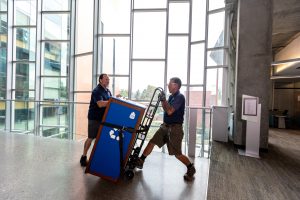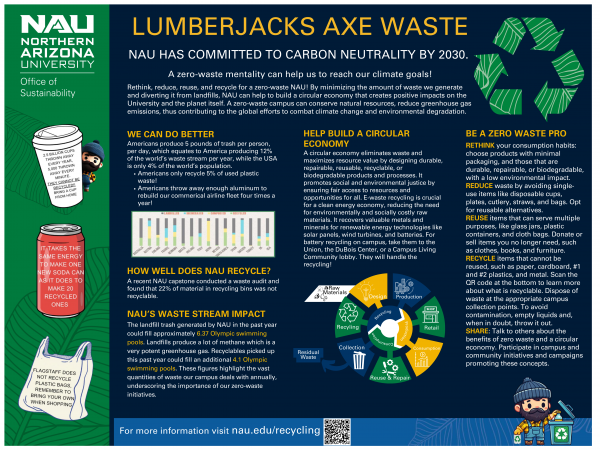Recycle Clean Today, For a Better Tomorrow
Why Recycle?
WE CAN DO BETTER
Americans produce 5 pounds of trash per person, per day, which equates to America producing 12% of the world’s waste stream per year, while the USA is only 4% of the world’s population. Americans only recycle 5% of used plastic waste! Americans throw away enough aluminum to rebuild our commercial airline fleet four times a year!
HOW WELL DOES NAU RECYCLE?
A recent NAU capstone conducted a waste audit and found that 22% of material in recycling bins was not recyclable but that it is an improvement over the year before we initiated the uniform system on campus. They also found that about 10% of total trash volume was recyclable. We expect the new system will decrease contamination of the recycle stream and reduce lost recyclables in the trash. The only dumpster on campus with 100% correct sorting of landfill and recycling waste was the ROTC building dumpster.
NAU’S WASTE STREAM IMPACT
The landfill trash generated by NAU in the past year could fill approximately 6.37 Olympic swimming pools. Landfills produce a lot of methane which is a very potent greenhouse gas. Recyclables picked up this past year could fill an additional 4.1 Olympic swimming pools. These figures highlight the vast quantities of waste our campus deals with annually, underscoring the importance of our zero-waste initiatives.
NAU’s Recycling System is Changing
As of Spring 2023, there will be a series of changes to the recycling system used on campus.
As part of NAU’s sustainability journey, the Office of Sustainability is very excited to announce that we are revamping our indoor recycling and landfill bin system. This project is a collaboration between the student-led NAU Green Fund and the NAU administration and is greatly needed. This revamp will streamline the system and will increase recycling on campus.

Why are these changes happening? Accordion Closed
- Upgrading our indoor bin system is long overdue and greatly needed.
-
- A lack of campus-wide uniformity in bins has been an issue for a while.
- Because bins across our buildings are not consistent in placement, design, and color, students, faculty, and staff might be confused about which materials should go to which bins.
- Clean recycling reduces the amount of waste sent to landfills, prevents pollution, and reduces greenhouse gas emissions.
- The Office of Sustainability’s goal is to reduce the contamination of items recycled on campus. When contaminants interact with recyclables, the quality of the recyclable is reduced or eliminated. Contamination is considered to be any material that is not accepted in Flagstaff’s recycling collection. All liquids and organics are contaminants. For example, although cardboard pizza boxes are recyclable, if they are oily or have food inside, they are not recyclable. When in doubt, throw it out!
What are the new features of this system? Accordion Closed
- Recycling bins will be blue with a white recycling symbol and landfill bins will be brown with a landfill symbol.
- We will provide added capacity for both recycling and landfill bins in common areas.
- Deskside bins will only be for recycling. Landfill materials can be disposed of in common hallway bins. This strategy will allow for more effective use of scarce custodial time, improve recycling rates, and decrease recyclable contamination.
- In most cases, large lobby unit bins with both recycling and landfill bins will be placed outside of classrooms, instead of small bins inside the classroom.
When will the new bins arrive? Accordion Closed
- Gradual deployment throughout the Fall 2023 semester.
- The Office of Sustainability will reach out with more communications and updates closer to when the new bins will be placed in your building.
- The Office of Sustainability knows that change requires adjustment and asks for your patience and collaboration as we go through this process.
- Departments should not purchase and install additional garbage bins for offices. We ask that faculty and staff do not bring their own personal bins, as that will add to the workload of our custodial staff and will impact the uniformity of the bin system.
- If the location and/or density of the hallway bins are not ideal, please let us know so we can work to resolve the issue.
Why are these changes happening? Accordion Closed
- Upgrading our indoor bin system is long overdue and greatly needed.
- A lack of campus-wide uniformity in bins has been an issue for a while.
- Because bins across our buildings are not consistent in placement, design, and color, students, faculty, and staff might be confused about which materials should go to which bins.
- Clean recycling reduces the amount of waste sent to landfills, prevents pollution, and reduces greenhouse gas emissions.
- The Office of Sustainability’s goal is to reduce the contamination of items recycled on campus. When contaminants interact with recyclables, the quality of the recyclable is reduced or eliminated. Contamination is considered to be any material that is not accepted in Flagstaff’s recycling collection. All liquids and organics are contaminants. For example, although cardboard pizza boxes are recyclable, if they are oily or have food inside, they are not recyclable. When in doubt, throw it out!
What are the new features of this system? Accordion Closed
- Recycling bins will be blue with a white recycling symbol and landfill bins will be brown with a landfill symbol.
- We will provide added capacity for both recycling and landfill bins in common areas.
- Deskside bins will only be for recycling. Landfill materials can be disposed of in common hallway bins. This strategy will allow for more effective use of scarce custodial time, improve recycling rates, and decrease recyclable contamination.
- In most cases, large lobby unit bins with both recycling and landfill bins will be placed outside of classrooms, instead of small bins inside the classroom.
When will the new bins arrive? Accordion Closed
- Gradual deployment throughout the Fall 2023 semester.
- The Office of Sustainability will reach out with more communications and updates closer to when the new bins will be placed in your building.
- The Office of Sustainability knows that change requires adjustment and asks for your patience and collaboration as we go through this process.
- Departments should not purchase and install additional garbage bins for offices. We ask that faculty and staff do not bring their own personal bins, as that will add to the workload of our custodial staff and will impact the uniformity of the bin system.
- If the location and/or density of the hallway bins are not ideal, please let us know so we can work to resolve the issue.
More questions can be answered on the Recycling FAQ page. Additional questions can be emailed to green@nau.edu.
Tips About Recycling At NAU
Recycling on campus Accordion Closed
- Keep it clean and dry—separate wet waste and food waste from recyclables.
- Look for the recycling symbol on bins.
- Refer to the City of Flagstaff’s recycling page to learn more about what can be recycled. Currently accepted materials are as follows: metal cans and pans (empty and clean), paper and cardboard (flattened boxes), plastic bottles, jugs, and jars only (no other plastics – no plastic cups/straws; no liquids; no organics).
More Information About Recycling: Metal Accordion Closed
Metal Cans, Tins, and Foil
- YES!
- Metal cans (aluminum, steel, tin)
- Disposable aluminum pie tins
- Aluminum foil
-
Gather clean aluminum foil into a ball about the size of a softball before recycling. Smaller pieces won’t make it through the sorting process.
-
- Pots and pans
- NO!
- Aerosol cans
- Food-crusted foil. If it’s not clean, don’t include it.
- Random metal objects/scrap metal
- WHY!
- It takes 90% less energy to create an aluminum can from recycled aluminum vs. creating one from scratch.
- Aluminum can be recycled thousands of times (infinitely, in fact!) and will never lose strength.
More Information About Recycling: Paper and Cardboard Accordion Closed
- YES!
- Paper
- Paper folders
- Magazines
- Paper envelops
- Cardboard
- Boxes – flatten to save space
- Cardboard tubes
- Paperback books
- Pizza boxes (no food, some grease okay)
- NO!
- Shopping receipts
- Paper with glitter, paint, watercolor, etc
- Waxy paper or cardboard
- Hardback books
- Loose shredded paper. Only accepted if contained in a paper bag
More Information About Recycling: Plastic Bottles, Jugs, & Jars Accordion Closed
- YES!
- Plastic bottles
- Plastic jugs
- Plastic jars
- NO!
- Plastic tubs, clamshells, other plastics
- Plastic bags
- Soft plastics
- Polystyrene
- Any food or liquids
- TIPS!
- Reattach plastic lids and caps so they get recycled too.
- Spatulas are excellent for getting the last bit of gunk out of bottles and jars.
- For oily bottles, like salad dressing, add a drop of dishwasher fluid and some water. Then reattach the lid and shake to get rid of the gunk and oily residue.
More Information About Recycling: What to Keep Out Accordion Closed
These items jam up equipment, ruin other recyclables, and/or threaten worker safety. Please keep them out of the recycle cart.
- Plastic bags and other soft plastics
- Clothing, textiles, and shoes
- Rechargeable electronics
- Computers and electronics
- Food and liquids
Campus Living Community Recycling Accordion Closed
- Separate recyclables from the trash in the bins provided in your residence hall room.
- Deposit clean recyclable materials in outdoor recycling dumpsters.
- Trash needs to be put in the marked “trash” dumpsters located directly outside of the halls.
- Instead of buying trash bags, line your bins with used shopping bags.
Administrative and academic building recycling Accordion Closed
- Please put your recyclables in marked recycling bins.
- Deposit wet wastes and non-recyclable materials in a central waste repository on your floor’s lounge or in bathroom trash containers.
- Custodial crews collect recyclables from your office or classroom and bag this material for the recycling dumpster.
Do you have questions about recycling? Check out the City of Flagstaff’s online Recycling Guide or NAU’s Recycling FAQ page.
Think you’re a savvy recycler? Take the QUIZ and prove it. Then challenge your friends, family, and coworkers.
